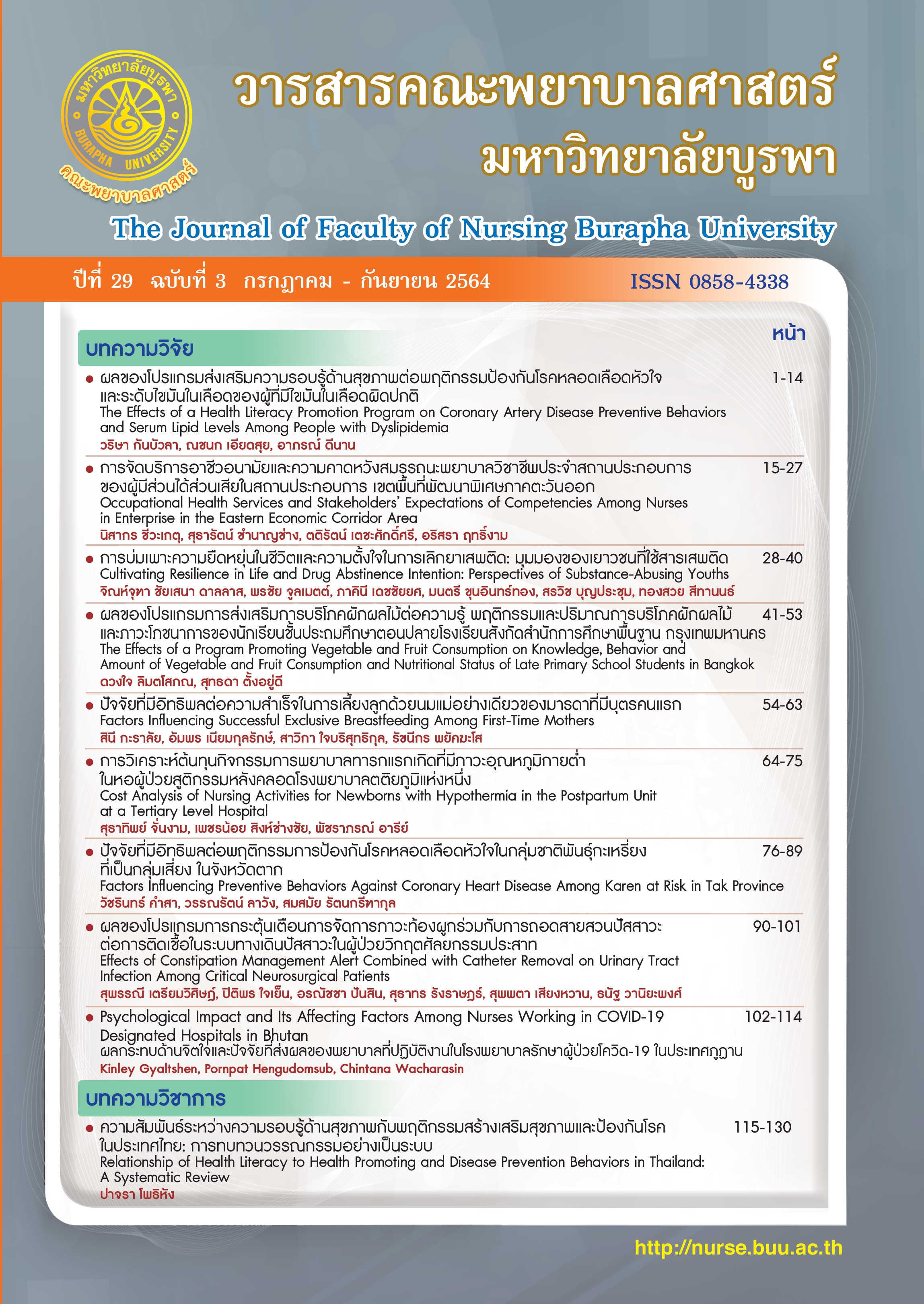ผลของโปรแกรมการส่งเสริมการบริโภคผักผลไม้ต่อความรู้ พฤติกรรมและปริมาณการบริโภคผักผลไม้ และภาวะโภชนาการของนักเรียน ชั้นประถมศึกษาตอนปลายโรงเรียนสังกัดสำนักการศึกษาพื้นฐาน กรุงเทพมหานคร
คำสำคัญ:
โปรแกรมการส่งเสริม, การบริโภคผักผลไม้, พฤติกรรม, ภาวะโภชนาการ, นักเรียนชั้นประถมศึกษาบทคัดย่อ
การศึกษาครั้งนี้เป็นการวิจัยกึ่งทดลอง เพื่อศึกษาผลของโปรแกรมการส่งเสริมการบริโภคผักผลไม้ต่อความรู้ พฤติกรรมและปริมาณการบริโภคผักผลไม้ และภาวะโภชนาการของนักเรียนชั้นประถมศึกษาปีที่ 4 และปีที่ 5 ของโรงเรียนสังกัดสำนักการศึกษาขั้นพื้นฐาน ในกรุงเทพมหานคร จำนวน 2 โรงเรียน เลือกกลุ่มตัวอย่างโดยการสุ่มแบบแบ่งชั้น จำนวน 170 คน กลุ่มตัวอย่างได้รับการส่งเสริมการบริโภคอาหารและภาวะโภชนาการตามปกติร่วมกับโปรแกรมการส่งเสริมการบริโภคผักผลไม้ เป็นเวลา 12 สัปดาห์ เครื่องมือที่ใช้ในการวิจัย ประกอบด้วยแบบบันทึกข้อมูลทั่วไปของผู้ปกครองและนักเรียน แบบสอบถามความรู้การบริโภคผักผลไม้ แบบสอบถามพฤติกรรมการบริโภคผักผลไม้ แบบบันทึกปริมาณการบริโภคผักผลไม้ของนักเรียน โปรแกรมคำนวณโภชนาการ เก็บข้อมูลก่อนและหลังสิ้นสุดโปรแกรม 1 เดือน วิเคราะห์ข้อมูลโดยใช้สถิติเชิงพรรณนา paired t-test, Wilcoxon Signed-rank Test, McNemar Bowker-Test
ผลการวิจัยพบว่า ภายหลังเข้าร่วมโปรแกรมการส่งเสริมการบริโภคผักผลไม้ นักเรียนกลุ่มตัวอย่างมีคะแนนความรู้เพิ่มขึ้นอย่างมีนัยสำคัญทางสถิติ (p < .05) ส่วนพฤติกรรมการบริโภคผักผลไม้และปริมาณการบริโภคผักผลไม้
ไม่แตกต่างจากก่อนเข้าร่วมโปรแกรม (p >.05) และสัดส่วนนักเรียนที่มีภาวะโภชนาการเกิน/อ้วนไม่แตกต่างจากก่อนเข้าร่วมโปรแกรมฯ (p > .05) ผลการศึกษาแสดงให้เห็นว่า โปรแกรมการส่งเสริมการบริโภคผักผลไม้ช่วยให้นักเรียนมีความรู้เกี่ยวกับการรับประทานผักผลไม้มากขึ้น ดังนั้นโรงเรียนควรจัดโปรแกรมการบริโภคผักผลไม้แก่นักเรียนอย่างต่อเนื่อง เพื่อให้นักเรียนเกิดความตระหนักถึงความสำคัญของการบริโภคผักผลไม้ และมีการติดตามประเมินพฤติกรรมการบริโภคและภาวะโภชนาการเป็นระยะ
เอกสารอ้างอิง
S., Paklaroen, H., Satreennopakhow, W., &
Thaikra, K. (2011). The report of national
health examination surveys IV (2009-2010)
in Thailand. Nontaburi: Health Systems
Research Institute (HSRI). Retrieved from
https://www.hiso.or.th/hiso/picture/report
Health/report/report1.pdf [In Thai]
Aekplakorn, W., Mosuwan, L., Ruangdaraganon, N.,
Satheannoppakao, W., & Paklaroen, H.
(2014) Report for Thai health survey on
physical examination 5th 2014. Retrieved
from https://www.hiso.or.th/hiso/picture/
reportHealth/report/thai2014kid.pdf
Areekul, V., Hongsanguansri, S., Tripathi S., &
Manaboriboon B. (2012). Practical point
in adolescent health care. Bangkok:
A-Plusprint. [In Thai]
Boonsook, S., Temchalearn, P., Pandee V., &
Kenkarnpanich, T. (2010). Applying the
theory of social support in vegetables and
fruits consumption promoting program in
grade 5 students in Warin Chamrap amphur,
Ubon Ratchathani province. Journal of
Public Health and Development, 8(3),
280-292. [In Thai]
Centers for Disease Control and Prevention [CDC].
(2019). Children eating more fruit, but
fruit and vegetable intake still too low.
Retrieved from https://www.cdc.gov/
nccdphp/dnpao/division-information/
media-tools/dpk/vs-fruits-vegetables/index.
html
Chaingkuntod, S., Muttawangkul, C., Chancharoen,
K., Hongkrailert, N., Romnukul, N., &
Udomsri, T. (2014). Knowledge and
behavior on food consumption of
pasicharoen persons. Bangkok: Research
center for community development, Siam
University. [in Thai]
Chaiyasung, P., Yakasem, P., & Chuthongrat, N.
(2014). Factors predicting food consumption
behaviors of overweight elementary school
students, grade 4-6. The Journal of
Boromarajonani College of Nursing,
Nakhonratchasima, 20(1), 30-43. [In Thai]
Chaolilitkul, N. (2016). Food and Nutrition for
6-12 years old children. In W. kriengsinyos
et al. The knowledge of food and nutrition
for all ages (pp. 37-45). Nonthaburi: Food
and Drug Administration [In Thai]
Cohen, J. (1992). Statistical power analysis. Current
Directions in Psychological Science, 1(3),
98-101. doi:10.1111/1467-8721.ep10768783
Damapong, S. (2017). The new dimensions to
develop the school age child to power of
Nutrition. Retrieved from https://www.
posttoday.com/life/life/477140
DeCosta, P., Moller, P., Frost, M. B., & Olsen, A.,
(2017). Changing children’s eating behavior
- A review of experimental research.
Appetite, 113, 327-357.
Food and Agriculture Organization of the United
Nations [FAO] & World Health Organization
[WHO]. (2017). Fruit and vegetables for
health initiative. Retrieved from http://
www.fao.org/3/i6807e/i6807e.pdf
Hunsakunachai, T. (2011). Child development &
behavior for nurse practitioner (2nd ed.)
Bangkok: Development and Behavior Club.
[In Thai]
Institute of Nutrition Mahidol University. (1995).
INMU-Thai growth calculating program.
Retrieved from http://www.ammo.moph.
go.th. [In Thai]
Jaicherdchoo, R., Udomvong, N., & Boonchieng,
W. (2013). Development of a community
participative program for health promotion
among overweight student. Nursing Journal,
40(2), 64-76. [In Thai]
Juntarungsri, P. (2015). Knowledge attitude and
vegetable consumption behavior of
prathomsuksa 4th-5th students in Rajini
school. Bangkok: Rajamangala University
of Technology Phra Nakhon. [In Thai]
Kichairam, P., Sangkamanee, P., Hanjangsit, K., &
Buranakongkatree, U. (2019). Effectiveness
of vegetable and fruit consumption
program to promote healthy eating among
elementary students of Warinchamrap
District, Ubon Ratchathani Province. TJPHS,
2(1), 1-14. [in Thai]
Klinkulab, C., Srisuriyawet, R., & Homsin, P.(2014).
Factors predicting fruit and vegetable
consumption among grade 6 primary school
students in Pa Mok district, Ang Thong
province. The Public Health Journal of
Burapha University, 9(2), 45-55. [in Thai]
Klunkin, P. (2012). Health promotion in children.
Khon Kaen: Department of Development
Nursing Network for Health Promotion.
[In Thai]
Mental Health Department. (2016). The national
health development plan during the
national economic and social development
plan, issue 12 (2017 -2021). Nonthaburi:
Mental Health Department [In Thai]
Pediatric Society of Thailand. (2017). Child care
and development guidance for parents of
school-age child (6-12 years). Retrieved
from http://www.thaipediatrics.org/Media/
media-20171010123138.pdf
Sirikulchayanonta, C. (n.d.). The bright and healthy
Thai kid project, development of the bright
and healthy Thai kid project: Extended
learning center in promoting nutrition and
exercise for bright and healthy Thai kids
4.0. Retrieved from https://www.dekthai
doodee.com/
Sukoltamut, S. (2008). Factors affecting breakfast
consumption pattern in primary school
students, yan nawa district, Bangkok.
Bangkok: Ramkhamhaeng university.
Retrieved from https://doi.nrct.go.th/ListDoi
/listDetail?Resolve_DOI=10.14457/RU.the.
2008.154 [In Thai]
Suwansin, S., Tunsakul, S., Therawiwat, M., &
Khajornchaikul, P. (2014). The effect of
fruits-vegetables program for changing fruits
and vegetables consumption behavior in
the fifth-grade students in bangkok. The
Public Health Journal of Burapha
University, 9(2), 97-107. [In Thai]
Wannasri, S., Therawiwa, M., Imamee, N., &
Chongsuwat, R. (2013). Fruit and vegetable
dietary behaviors in elementary school
students Surat Thani province. Thailand.
Journal of Health Education, 36(124), 45-60.
[In Thai]
Youngiam, W., Pavadhgul, P., Pradipasen, M. &
Imamee, M. (2013). Promoting fruit and
vegetable intake through the application
of social cognitive theory among 4th grade
students in Phrompiram district, Phitsanulok
province. Journal of Public Health, 43(2),
126-137. [In Thai]





